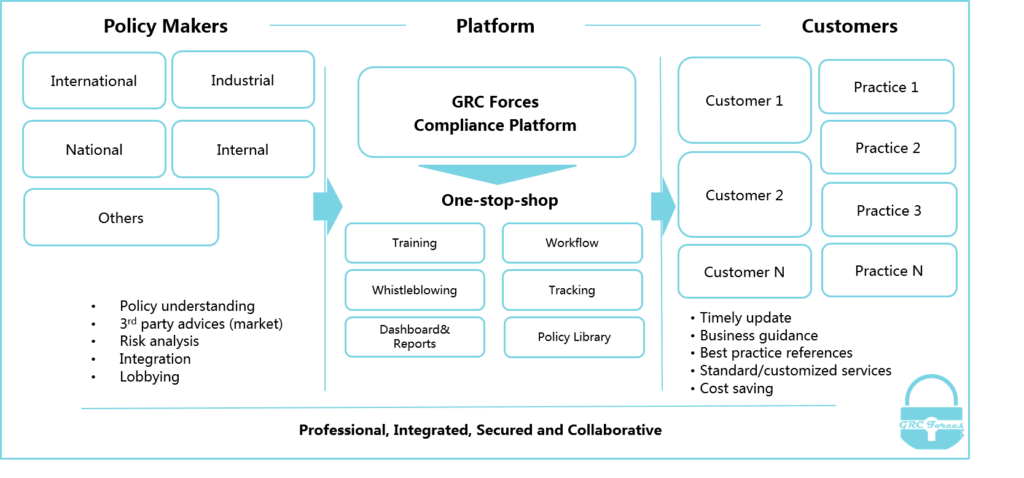Solution
What is Compliance?
“Compliance” means “comply with regulations” . The “regulations” here include several levels of content:
- The laws and regulations of the country or region where the corporate headquarters, branches and subsidiaries are located;
- The rules of the industry in which the company is located or internationally accepted norms, etc.;
- The internal rules and regulations formulated by the company according to its own management needs, including corporate values, culture, ethics, and business conduct codes, etc.;
Compliance management, together with business management and financial management, are called the three pillars of corporate management. It is an important aspect of internal control and a key link in risk management. Effective compliance management helps companies deal with uncertainties, risks and opportunities, protects and increases shareholder value, and reduces the possibility of unexpected losses and reputation losses.
Compliance management system building up, compliance consulting, compliance review, compliance inspection, compliance monitoring, tracking of laws and regulations, compliance reporting, anti-money laundering, complaint report handling, supervision cooperation, information isolation wall (monitoring list and restriction list) , compliance culture construction, compliance information system construction, compliance assessment, compliance accountability, etc.

The importance of compliance
In recent years, the world structure has undergone tremendous changes. The rise of China, the Brexit of the United Kingdom, the political division of the United States, etc., directly or indirectly affect the business environment of the entire world, and multinational companies are facing huge opportunities and challenges. It forces us to think about how we can help multinational companies reduce compliance risks, ensure the smooth progress of business, and achieve the established strategic goals of the company in the current increasingly fierce competition between countries and enterprises.
In recent years, there have been an endless stream of cases that have been severely punished by relevant regulatory agencies for violating market fair competition, anti-fraud and anti-corruption, environmental protection standards, quality requirements and other compliance regulations. All of these cases have brought huge economic losses to enterprises.
- In September 2015, the U.S. Environmental Protection Agency accused some diesel engines produced by the Volkswagen Group of using “failsafe” to circumvent exhaust emission monitoring. Volkswagen finally reached a partial settlement agreement with the regulator for $14.7 billion
- In early 2016, Dutch telecommunications giant VimpelCom was punished by the SEC and DOJ with a total of 9.5 billion U.S. dollars for bribing government officials in Uzbekistan
- In December 2016, SAIC GM was fined 1.1 billion yuan by the Shanghai Municipal Price Bureau due to monopoly. This is another domestic vehicle company that has been punished for monopoly after Audi, Mercedes-Benz, Chrysler and Nissan
- In November 2016, the New York State Bureau of Financial Services imposed a fine of US$1.5 billion on the New York branch of a Chinese bank for violating anti-money laundering laws and covering up suspicious financial transactions
- In recent years, Google has been subjected to ongoing antitrust investigations in the United States, India, South Korea, Japan, Australia, Brazil, Canada, Russia and other countries. In the three years from 2017 to 2019 alone, the European Union has issued US$2.71 billion to Google and US$5 billion. US dollars and 1.69 billion US dollars in three “sky-price tickets” accusing Google of abusing its dominant position in the search engine and other markets
We have seen more and more companies begin to attach importance to corporate compliance work, and take active risk management in response to corporate internal, national policies, industry rules and international regulations. However, due to the lack of a comprehensive management system and effective management methods, many companies, despite the establishment of compliance management departments or organizations, still cannot meet the requirements for compliance management. Compliance management and internal control, legal affairs and audit work overlap and overlap in many aspects, which also caused a lot of duplication of work.
Globalization?


Industrial Pain Points
In the face of compliance issues, multinational companies and their overseas branches often ask the following questions:
- What regulations or policies must I follow?
- How do I understand the complicated items?
- What do I have to do in my business accordingly?
- How can I ensure that everything is settled?
- Should I be blamed if some noncompliance happened in my business?
- Can I prove that I have done whatever I need to do?
The above problems correspond to the pain points of various companies in the current compliance work, including:
- Too many regulations
- Puzzling terms and items
- Difficult to translate into business
- Hardly to monitor
- Unknown risks
- No evidence to prove
Our platform is launched to solve the above problems. By combing the internal and external policies and rules of the company, setting up a compliance management strategy, establishing a corporate compliance management system, identifying risk points in corporate operations, proposing rectification suggestions and detailed into implementable steps, and finally embedding compliance management The platform conducts daily management of compliance events before, during and after the event.
solution overview

GRC Forces is a cloud platform dedicated to providing customers with compliance management solutions.
- Establish or improve a compliance management system for customers by sorting out internal and external laws, regulations, systems, and standards
- Refine compliance requirements into executable steps and embed them in the compliance management system to reduce corporate compliance risks and allow customers to focus on corporate operations
- The platform not only provides standard templates in various compliance scenarios, but also can perform individual customized development or access third-party content for customers, which has strong scalability
- Cloud-based solutions allow customers to get rid of the huge investment in the initial construction of traditional IT, and can be quickly implemented and deployed; at the same time, it also supports private cloud or on premise installation methods
- Users can access through various media, including web pages, pads, mobile phones, etc., flexible access
- The content of the platform is updated in time according to changes in laws and regulations, reminding compliance personnel to take action
- Quantify compliance by setting KPIs and reflect the results of corporate compliance work
- Flexible payment methods to reduce the cost burden of enterprises
